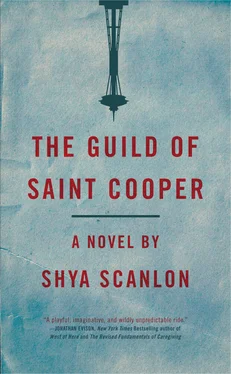“You’re in luck,” Zane said flatly. “Bathyspheres are on the route today.”
“As in those underwater—”
“Good morning, Zane!”
My mother appeared at my side, and a moment later I was following them through the house and onto the back porch. She asked him about his day, and about his partner — whose existence was a complete surprise to me — and something both sad and wonderful occurred to me: Zane was my mother’s friend. In fact, he was her only friend.
“Is he still distrustful?” asked my mother.
Zane looked at me briefly and then nodded.
“Well, what did I tell you? When you withhold, people can sense it, and it makes them feel like you’ve got something to hide. Didn’t I tell you?”
Zane looked rather crestfallen. “Yeah,” he said.
“Trauma or no trauma, you’ve just got to let Richard in. Blake knows — don’t you, Blake.”
“I know?”
“It was the same way with Blake’s father, though I was in Richard’s place. He had PTSD — totally closed off.”
“So how’d you get him to open up?” Zane asked.
“She didn’t,” I said.
My mother looked at me like I’d ruined the ending. Zane looked defeated. I apologized.
“No, no, he’s right, I didn’t.”
The bluegrass band that had played the day before began to play again. From five blocks away we could hear only the snare drum and a few scattered rising notes of the singer’s voice, but the song sounded upbeat.
“I know I’ve just got to tell him how I’m feeling,” Zane said, “but it makes me so angry when he acts like I’m sneaking around behind his back.”
My mother stood and gave him a long hug. I watched them embrace and grew a tiny bit jealous. It wasn’t just the physical contact; it was the fact that they’d clearly been having this protracted dialogue about Zane’s love life without my knowing. They hadn’t sought me out, they hadn’t included me in any way, and my mother hadn’t even thought to tell me they were friends.
“So what’s this I hear about you taking my son to a Bathysphere?”
“One of my clients,” Zane said. “He’s building a home underwater. I mean, it’s not entirely underwater yet, but he’s building it so it can be, or will be, or would be, I mean.”
“Would be?” I asked.
“You know, if the tsunami…”
“I wasn’t aware the matter was in question.”
My mother smiled and patted Zane on the cheek. “You two have a good time.”
We headed down 15th Avenue, bumping slowly over the cracked cement in four-wheel drive. Zane hunched over the steering wheel, strangely overcautious. Learning that he was gay had made me see him differently. It made him seem more vulnerable. More likeable.
“Who runs the Ballard Bridge?” I asked.
“Just so you know,” he said, “my partner and I aren’t, like, completely dysfunctional or anything.”
“Everyone’s got issues. Russell told me about the bus.”
He rolled his eyes. “God, it’s like he’s proud of it.”
“Well, it’s pretty wild.”
“What it does is support the version of Seattle he likes to convince people about. Big, hypocritical Seattle running itself into the ground.”
“That’s not the Seattle you remember?”
We crossed Market and the bridge became visible up ahead. To the right, a Brown Bear carwash sprawled helplessly. Zane pointed to the left: Louie’s Cuisine of China.
“You know Louie’s grandson lives in the restaurant? He hasn’t come out since the evacuation. We bring him eggs.”
“We?”
“Well, me.”
I looked at the low, windowless building as we passed, imagining a skinny boy in a bathrobe pacing around with an Uzi.
“What are eggs?” I asked.
Zane gave me a look.
“What? Sorry I’m not up on my drug lingo.”
“I’m not talking about drugs. You think all we do is deal drugs?”
Zane began to say something but stopped himself and braked. At the near side of the bridge stood a large group of Indians. They were standing around a bonfire. It was still early, but already hot, so the fire was obviously serving no purpose other than intimidation. They turned toward us as we drew near. Zane, I noticed, had none of the bravado he’d demonstrated two days earlier on the bike. He pulled up close to them and waved. There was no wave back.
He leaned his head out the window. “Hey, fellas,” he said. “Mind letting us through?”
Slowly, slowly, a passage opened up and we crept forward. Zane kept his eyes trained on the far side of the bridge, where another group had gathered and stood around an equally intimidating fire. In the water below the bridge was a cluster of fishing boats, half-sunk, their bows and sterns pointing up at oblique angles like whales frozen mid-breach. As we moved through the second crowd I realized they weren’t all Native Americans. In fact, it was evenly split between races. I’d been assuming these were the same people who held the Fremont Bridge, but either I was wrong or they’d been recruiting.
“Sympathizers?”
“Shh.”
We headed west along a small road that hugged the canal, passed through an area lined with industrial structures and storage, and drove under the train bridge and by another row of abandoned houses, another area of town that had disappeared into the subtle shifts of color and light produced by disuse, destruction, or both.
“Have you ever heard of the term ‘defamiliarization’?”
Zane didn’t respond.
“It was coined by a guy named Shklovsky. Basically, it’s the artistic practice of reframing familiar things in order to allow people to see them directly, without preconceptions. I wonder sometimes if the evacuation of Seattle was a great work of defamiliarization, but one we were too far gone to appreciate.”
“Who says I don’t appreciate it?”
“Well, do you take it for granted?”
We were approaching what appeared to be the end of the street, and I could see snatches of Puget Sound ahead of us, and to our left a road called Hooker. Hooker was roughly one hundred feet long, and met with another street heading back the way we came.
“If I was really taking it for granted I wouldn’t know it, right?”
“You could have a hunch.”
“Sorry,” he said. “The term doesn’t ring a bell.”
Zane stopped without pulling over, leapt out of the truck, and as he pulled milk crates filled with various machine parts from the bed he began explaining the delivery.
“Guy’s name is Sergeant George Washington.”
I got out. The smell of low tide was intense. “That should be easy to remember.”
“He was one of our earliest customers. Already began his work before the evacuation, so the first thing he did was move his whole operation down the road.” Zane nodded at the house we stood before, a flat, gray, glassy thing that spilled its stories over the bluff.
“What’s he building, exactly?”
Zane handed me a crate. “That’s top secret, soldier,” he said with a wink.
The floors of the house were barely visible, covered by what looked like plumbing, and we wound single file through a narrow passage kept clear by necessity. Zane called out, “Sarge, Sarge, Sarge” so the man would hear us coming. The tall, narrow windows around the stairwell looked out over the Sound. The tide was way back, the black, debris-strewn bottom sludge exposed like gnarly tooth roots.
“Sarge!”
We descended three flights and went out a door at nearly sea level. The smell down here was even more powerful, and I gagged before being able to focus on what we’d come to see: a series of round steel tanks, ten feet in diameter, lying in a crooked line from the land out into the channel, and a naked, wiry man climbing down from one toward the far end. We put down our crates.
Читать дальше












